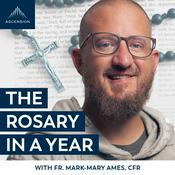Available Episodes
5 of 72
- 00 – IntroductionBrought to you by Muslim Central. Help cover running costs and support future projects by donating at https://muslimcentral.com/donate/--------0:55
- [1:1-7] – Al-Fatiha – Guidance To The Straight PathSūrah al-Fātiḥah; The most powerful and comprehensive Du’ā بِسۡمِ ٱللَّهِ ٱلرَّحۡمَٰنِ ٱلرَّحِيمِ. ٱلۡحَمۡدُ لِلَّهِ رَبِّ ٱلۡعَٰلَمِينَ. ٱلرَّحۡمَٰنِ ٱلرَّحِيمِ. مَٰلِكِ يَوۡمِ ٱلدِّينِ. إِيَّاكَ نَعۡبُدُ وَإِيَّاكَ نَسۡتَعِينُ. ٱهۡدِنَا ٱلصِّرَٰطَ ٱلۡمُسۡتَقِيمَ. صِرَٰطَ ٱلَّذِينَ أَنۡعَمۡتَ عَلَيۡهِمۡ غَيۡرِ ٱلۡمَغۡضُوبِ عَلَيۡهِمۡ وَلَا ٱلضَّآلِّينَ. In the name of Allah, the Entirely Merciful, the Especially Merciful. [All] praise is [due] to Allah, Lord of the worlds - The Entirely Merciful, the Especially Merciful, Sovereign of the Day of Recompense. It is You we worship and You we ask for help. Guide us to the straight path - The path of those upon whom You have bestowed favor, not of those who have earned [Your] anger or of those who are astray. Bi-smi llāhi r-raḥmāni r-raḥīmi. Alḥamdu-lillāhi Rabbi-l-ʿālamīn, ar-Raḥmāni-r-Raḥīm, Māliki yawmi-d-dīn, iyyāka naʿbudu wa iyyāka nastaʿīn, ihdina-ṣ-Ṣirāṭa-l-Mustaqīm, ṣirāṭa-lladhīna anʿamta ʿalayhim ghayri-l-maghḍūbi ʿālayhim wa la-ḍ-ḍāllīn. "It is You we worship identifies the objective, and it is You we seek for help states the means of achieving that objective. Allah is the means of worshipping Allah. The beginning is from Allah and the end is to Allah.” The Straight Path in this context is not just Islam as a whole; it is the path to knowing what is right and following it in every aspect of our lives. Because adherence to the Straight Path is an arduous task, Allah has commanded that we supplicate and ask Him to guide us to it a minimum of 17 times a day. -Ibn Taymiyah and Mukhtasar Minhaaj al-Qasideen.--------1:13
- [2:127] – For The Acceptance of Acts of Worshipرَبَّنَا تَقَبَّلۡ مِنَّآۖ إِنَّكَ أَنتَ ٱلسَّمِيعُ ٱلۡعَلِيمُ. Our Lord, accept [this] from us. Indeed You are the Hearing, the Knowing. Rabbana taqabbal minna innaka Anta-s-Samiu-l-Alim. Although Prophets Ibraheem and Isma’eel were carrying out Allah’s command by raising the foundations of the Ka’bah, they were still concerned that Allah might not accept this deed from them. This is a direct result of the humility and humbleness with which they worshipped Allah, and so they supplicated in earnest hope that Allah would accept this magnificent act of worship and that it would bring benefit to nations and generations to come. - Tafseer As-Sa’di.--------0:16
- [2:128] – General, For Guidance, Forgiveness and For the Guidance of One’s Childrenرَبَّنَا وَٱجۡعَلۡنَا مُسۡلِمَيۡنِ لَكَ وَمِن ذُرِّيَّتِنَآ أُمَّةٗ مُّسۡلِمَةٗ لَّكَ وَأَرِنَا مَنَاسِكَنَا وَتُبۡ عَلَيۡنَآۖ إِنَّكَ أَنتَ ٱلتَّوَّابُ ٱلرَّحِيمُ. Our Lord, and make us Muslims [in submission] to You and from our descendants a Muslim nation [in submission] to You. And show us our rites and accept our repentance. Indeed, You are the Accepting of repentance, the Merciful. Rabbana wajalna muslimayni laka wamin dhurriyyatina ummatan muslimatan laka waarina manasikana watub alayna innaka anta ttawwabu rrahim. Prophets Ibraheem and Isma’eel ask Allah to raise from their descendants a people who would submit themselves, in both heart and body, to His Will. They ask Allah that He teaches these descendants different acts of worship—both specific to the rites of Pilgrimage and those more general than that. This admirable supplication is essentially a request that Allah bless them with sincerity and the ability to do righteous deeds. Regardless of a servant’s virtue, sincerity, or devotion to their Lord, shortcomings in one’s duty to Allah are inevitable. For this reason, they both ask Allah to forgive them for such shortcomings and to accept their repentance. -Tafseer As-Sa’di.--------0:39
- [2:201] – General, For Contentment and Safety In This Life And In The Hereafterرَبَّنَآ ءَاتِنَا فِي ٱلدُّنۡيَا حَسَنَةٗ وَفِي ٱلۡأٓخِرَةِ حَسَنَةٗ وَقِنَا عَذَابَ ٱلنَّارِ. Our Lord, give us in this world [that which is] good and in the Hereafter [that which is] good and protect us from the punishment of the Fire. Rabbana atina fiddunya hasanah wa filakhirati hasanah wa qina adhabanNar. This supplication brings together the good of this life and the good of the Hereafter, just as it is a supplication for safety against evil in both worlds. The good of this life includes things like wellness, a comfortable home, a righteous spouse, generous provision, beneficial knowledge, the practice of righteous deeds, a comfortable means of transport, an honorable reputation among one’s peers, and other blessings. Good in the Hereafter includes entering Paradise and attaining its luxury and security, remaining steadfast when questioned about one’s deeds, and attaining safety and security in every other situation. Protection against the punishment of Hellfire necessitates that one is granted protection against its preconditions in this life. Hence, this is also a supplication that Allah safeguards us against falling into what is prohibited as well as any doubtful matters that may lead to sin. -Ibn Katheer.--------0:24
More Religion & Spirituality podcasts
Trending Religion & Spirituality podcasts
About Dua Connect
Audio Supplications from the Quran, recited by Mufti Ismail Menk. Includes
English
Translation, Transliteration & Arabic.
Podcast websiteListen to Dua Connect, Jesus People Podcast and many other podcasts from around the world with the radio.net app

Get the free radio.net app
- Stations and podcasts to bookmark
- Stream via Wi-Fi or Bluetooth
- Supports Carplay & Android Auto
- Many other app features
Get the free radio.net app
- Stations and podcasts to bookmark
- Stream via Wi-Fi or Bluetooth
- Supports Carplay & Android Auto
- Many other app features


Dua Connect
Scan code,
download the app,
start listening.
download the app,
start listening.

































